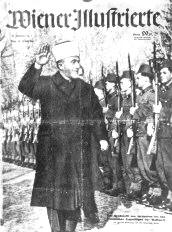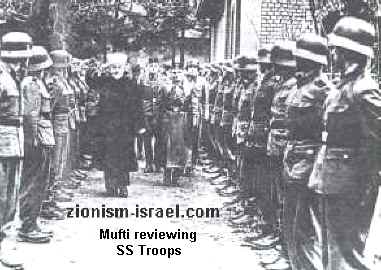
 |
Zionism and Israel - Encyclopedic
Dictionary
|
| Zionism | maps | history | biography | definitions | e-Zion | about | issues | photos | documents | links | contact |
|
Hajj (Muhamed Effendi) Amin al Husseini, Grand Mufti of Jerusalem - (also Hussayni or Hajj Amin el Husseini) -
(1895-1974) -- A radical pro-Nazi Palestinian and Muslim leader, scion of the
influential Husseini family of Jerusalem. In WW I, he fought for the Ottoman Turks as did many Jewish and Arab
Palestinians but eventually changed sides.
With Aref el-Aref, Husseini was largely responsible for riots started in 1920 ("Nebi musa") . Husseini was jailed, but subsequently released and elected Grand Mufti of Jerusalem in an election rigged by Sir Herbert Samuel, the British High Commissioner, who thought to co-opt his radicalism. Because of his position and family connections, the Mufti had access to about 200,000 pounds annually, much of which was used to finance terror campaigns as well as to advance his own position. |
 |
| Palestinian leader, Former Grand Mufti of Jerusalem, Hajj Amin Al Husseini, shown reviewing Nazi troops on the cover of the Vienna Illustrated (Wiener Illustrierte) magazine. |
The "Grand Mufti" title was invented by the British. The Mufti used that title and several others, such as "eminence." The sheikh-and president of his former university, Al-Azbar in Cairo, noted:
In Islam, there are no "eminencies" and no "grand" muftis. Before Allah all men are equal, and it ill behooves a religious teacher to assume such redundant titles... A mufti is a teacher in Islam. And even to that title Hajj Amin should have no claim, for he has not finished a single course of studies here at the University. He owes his appointment to political influence and family connections. He is a politician.
Husseini's early attitude regarding Zionism was expressed as follows to a Jew named Abbady, a native of Palestine, who worked with him at one time:
Remember, Abbady, this was and will remain an Arab land. We do not mind you natives of the country, but those alien invaders, the Zionists, will be massacred to the last man. We want no progress, no prosperity. Nothing but the sword will decide the fate of this country.
He told an interviewer, Ladislas Farago:
The Jews have changed the life of Palestine in such a way that it must inevitably lead to the destruction of our race. We are not accustomed to this haste and speed, and therefore we are continually being driven into the background.
(Both quotes from http://notendur.centrum.is/~snorrigb/mufti1.htm )
The British made Husseini head of the Supreme Muslim Council and gave him considerable resources. The head of the council was supposed to be elected every 5 years, but Husseini seized control and terrified others. He controlled the allowance of the council from the mandatory government, Muslim charity money and donations from abroad. He used these resources to buy patronage influence. As Mufti, Husseini initiated renovations of the Al-Aqsa and Omar mosques on the temple mount (Haram as Sharif) in order to build up the importance of Jerusalem as a Muslim holy place and Palestinian national symbol. These projects increased his prestige immensely in the Arab world and were a good way to raise funds from abroad and provide work, thus providing him with an additional source for giving out patronage. He apparently instigated the riots of 1929. He took over leadership of the Arab Revolt (Great Uprising) of 1936-1939, apparently funded by the Italian Fascist government or the Nazis. Count Ciano, the Italian Foreign Minister, stated in 1940 that the Italians had funded the Mufti for many years, and likewise the German Siecherheitsdienst (Secret Service) claimed that without their support, the Arabs could not have continued their resistance to the British in Palestine.
The Mufti formed the Higher Arab Committee and used the revolt to settle scores with rival Palestinian clans, murdering hundreds of leaders in 11 different clans. It is reported that he met with Nazi war criminal Adolf Eichmann in September or October of 1937, when Eichmann visited Palestine for a day. Eichmann was investigating the possibility of deporting Jews to Palestine. Reportedly, the Mufti persuaded him against this scheme. However, it is not at all clear that the Mufti was still in Palestine when Eichmann visited. In September or October of 1937, following the murder of the British commissioner for the Galilee, Husseini and the entire "Higher Arab Committee" fled first to Lebanon and then to Iraq, where he engineered a pro-Axis coup. On May 10, 1941 the Mufti broadcast a Fatwa (religious ruling) calling for a holy war against the British. This speech was carried by Iraq and Axis radio stations. Typically, a major complaint in this Fatwa was that the British profaned the Al-Aqsa mosque and were out to destroy Islam:
When the Iraqi coup failed, Hajj Amin Al-Husseini fled to Nazi Germany, along with Fawzi El Kaukji. In Germany, he broadcast for the Nazis. He lobbied extensively to prevent Jews from escaping Germany. In 1943, he was sent to Yugoslavia, where he organized
"
 |
|
|
At the Nuremberg Trials in July 1946, Dieter Wisliceny testified:
"The Mufti was one of the initiators of the systematic extermination of European Jewry and had been a collaborator and adviser of Eichmann and Himmler in the execution of this plan... He was one of Eichmann's best friends and had constantly incited him to accelerate the extermination measures. I heard him say, accompanied by Eichmann, he had visited incognito the gas chambers of Auschwitz."
Wisliceny also testified that after the Mufti's arrival in Germany he had paid a visit to Himmler and shortly afterwards (late in 1941 or early in 1942) had visited Eichmann in his Berlin office at Kürfurstrasse, 116. According to Wisliceny, Eichmann told him that he had brought the Mufti to a special room where he showed him maps illustrating the distribution of the Jewish population in various European countries and delivered a detailed report on the solution of the Jewish problem in Europe. Some of Wisliceny's testimony regarding Eichmann may have been self-serving as is claimed, but the evidence that the Mufti was an avid Nazi and was personally responsible for the mass murder of many Jews is not lacking, even without Wisliceny's testimony.
When the Red Cross offered to mediate with Adolf Eichmann in a prisoner-of-war exchange involving the freeing of German citizens in exchange for 5,000 Jewish children being sent from Poland to the Theresienstadt death camp, Husseini directly intervened with Himmler and the exchange was cancelled.
The Mufti's role in war crimes was well documented, but he escaped detention in France, where he was awaiting trial, evidently because the French sought to derail British plans for Palestine. He then orchestrated the Palestinian civil war against the Jews, in opposition to the UN partition plan. He organized Arab League support for the Palestinian cause, and explained to the British that the solution he would adopt for the Jewish problem in Palestine was the same one as that adopted in Europe - extermination. His Nazi associations did not prevent the Mufti from remaining a revered Palestinian leader.
The significance of the Mufti and his party in Palestinian society and in the history of Zionism and the Palestinian-Israeli conflict was critical and must not be ignored. The Husseini family massacred the moderate leadership of the Arab Palestinian community, leaving them largely without effective leadership, creating an ominous tradition of clan warfare, and firmly establishing the most radical sort of Jew-hatred as a major political element among the Arab Palestinians. Beginning in 1920, Husseini entrenched a tradition of Arab Palestinian pogroms against Jewish civilians, including non-Zionists, featuring the worst sort of atrocities against women, children and old men. This sort of violence also bred an unhealthy taste for revenge, as well as fear. For the Zionists, the Mufti represented the threat of imminent genocide, and his leadership and statements gave the Zionists to understand that the war with the Palestinians was a take-no-prisoners us-or-them life or death struggle.
On the other hand, the Mufti's influence waned after the Israel War of Independence. For western consumption at least, Palestinians tend to ignore his Nazi affiliations rather than revel in it. Feisal Husseini, his relative who held the portfolio for Jerusalem in the Palestinian National Authority, was a relative moderate, and other members of the Husseini clan are not necessarily allied with the ideology of Hajj Amin al Husseini.
Ami Isseroff
Synonyms and alternate spellings: Haj Amin El Hussayni Hajj Amin al Hussayni, Haj Ameen al Hussayni
Further Information: The Iraq Pro-Axis Coup of the Grand Mufti, Haj Amin el Husseini and the Farhud Arab Riots and Massacres of 1929 The Grand Mufti Haj Amin El Husseini Nebi musa http://notendur.centrum.is/~snorrigb/muftism.htm Muftism and Nazism
Hebrew/Arabic pronunciation and transliteration conventions:
'H - ('het) a guttural sound made deep in the throat. To Western ears it may sound like the "ch" in loch. In Arabic there are several letters that have similar sounds. Examples: 'hanukah, 'hamas, 'haredi. Formerly, this sound was often represented by ch, especially in German transliterations of Hebrew. Thus, 'hanukah is often rendered as Chanuka for example.
ch - (chaf) a sound like "ch" in loch or the Russian Kh as in Khruschev or German Ach, made by putting the tongue against the roof of the mouth. In Hebrew, a chaf can never occur at the beginning of a word. At the beginning of a word, it has a dot in it and is pronounced "Kaf."
u - usually between oo as in spoon and u as in put.
a- sounded like a in arm
ah- used to represent an a sound made by the letter hey at the end of a word. It is the same sound as a. Haganah and Hagana are alternative acceptable transliterations.
'a-notation used for Hebrew and Arabic ayin, a guttural ah sound.
o - close to the French o as in homme.
th - (taf without a dot) - Th was formerly used to transliterate the Hebrew taf sound for taf without a dot. However in modern Hebrew there is no detectable difference in standard pronunciation of taf with or without a dot, and therefore Histadruth and Histadrut, Rehovoth and Rehovot are all acceptable.
q- (quf) - In transliteration of Hebrew and Arabic, it is best to consistently use the letter q for the quf, to avoid confusion with similar sounding words that might be spelled with a kaf, which should be transliterated as K. Thus, Hatiqva is preferable to Hatikva for example.
Definitions of Zionism General History of Zionism and the Creation of Israel History of Israel and Zionism Historical Source Documents of Israel and Zionism
Back to main page: http://www.zionism-israel.com Zionism and Israel Information Center
This site is a part of the Zionism and Israel on the Web Project
Copyright
This work and individual entries are copyright © 2005 by Ami Isseroff and Zionism and Israel Information Center and may not reproduced in any form without permission unless explicitly noted otherwise. Individual entries may be cited with credit to The Encyclopedia and Dictionary of Zionism and Israel
ZioNation - Zionism-Israel Web Log Zionism & Israel News Israel: like this, as if Bible Bible Quotes History of Zionism Zionism FAQ Zionism Israel Center Maps of Israel Jew Israel Advocacy Zionism and its Impact Israel Christian Zionism Site Map